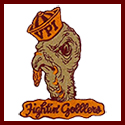|
A big thing is to ask lots of questions (within reason, don't start fishing for something if you totally cannot think of something relevant) but an intern candidate who is curious and asks questions about working there will always be liked more than the guy who just answers questions and sits there.
|
|
|
|

|
| # ? May 15, 2024 15:58 |
|
Frinkahedron posted:A big thing is to ask lots of questions (within reason, don't start fishing for something if you totally cannot think of something relevant) but an intern candidate who is curious and asks questions about working there will always be liked more than the guy who just answers questions and sits there.
|
|
|
|
But don't ask questions that could easily be googled. I sat in on an interview one time where the interviewee asked "so what does this company do?" The interviewer and I looked at eachother with our mouths open and rushed through the interview so as not to be rude, but never called him back. Interviewers want to know that your interested in the job enough to have done some research. At the interview for the internship I have now, I asked some technical questions that made the interviewers think a little. But also don't monopolize the interview with questions like that, the interviewers are busy people who appreciate interest, but hate rear end-kissers. fatlightning fucked around with this message at 18:47 on May 20, 2011 |
|
|
|
fatlightning posted:But don't ask questions that could easily be googled. I sat in on an interview one time where the interviewee asked "so what does this company do?" The interviewer and I looked at eachother with our mouths open and rushed through the interview so as not to be rude, but never called him back. When I graduate, it's good to know that small talk will immediately disqualify me for a position. e: \/ \/ You automatically dismissed a guy right off the bat for asking a pretty normal question. TheOmegaWalrus fucked around with this message at 18:57 on May 20, 2011 |
|
|
|
TheOmegaWalrus posted:When I graduate, it's good to know that small talk will immediately disqualify me for a position. That's not what I was getting at. Small talk is fine, it lets the interviewer get to know you on a more personal level, but don't sit there for half an hour trying to talk about baseball. Asking "what does this company do?" just lets the interviewer know that you don't care enough to do some research before hand. fatlightning fucked around with this message at 18:57 on May 20, 2011 |
|
|
|
Thanks everyone for all the advice  I've already done my research - even found their YouTube channel and watched their holiday greetings video, hahah. So I think the main thing will be really paying attention during the tour, which I had kind of figured. Hope this works out! I've already done my research - even found their YouTube channel and watched their holiday greetings video, hahah. So I think the main thing will be really paying attention during the tour, which I had kind of figured. Hope this works out!
|
|
|
|
TheOmegaWalrus posted:
Why are you applying to work at a company if you don't know what they do?
|
|
|
|
TheOmegaWalrus posted:When I graduate, it's good to know that small talk will immediately disqualify me for a position.
|
|
|
|
fatlightning posted:But don't ask questions that could easily be googled. I sat in on an interview one time where the interviewee asked "so what does this company do?" The interviewer and I looked at eachother with our mouths open and rushed through the interview so as not to be rude, but never called him back. If the candidate builds upon your explanation of what you do at the company ("Oh I see, so you guys do X, Y and Z."), then I would let it slide. From my experience with being asked this type of question by an interviewee, you either have a complete slacker or an egotistical prick on your hands, neither of which would get a callback from me.
|
|
|
|
.
Thoguh fucked around with this message at 14:54 on Aug 10, 2023 |
|
|
|
I finished my first week of internship in a manufacturing plant working with the process engineering group (hi Thoguh). I've come in during a fun time where they are completely reprogramming all their data acquisition and database software for a wave of new hardware in the facility. Only thing I've done so far is recreating an old 5000 line VAX C program in VB.NET to communicate with PLCs and dump the data registers into a database. My friend insists I don't release the source code without some sort of compensation/licensing agreement with the company. Is there any legitimacy to this or is he just trying to get me to be an rear end? SeXTcube fucked around with this message at 01:11 on May 21, 2011 |
|
|
|
A Jew in Manhattan posted:I finished my first week of internship in a manufacturing plant working with the process engineering group (hi Thoguh). I've come in during a fun time where they are completely reprogramming all their data acquisition and database software for a wave of new hardware in the facility. Only thing I've done so far is recreating an old 5000 line VAX C program in VB.NET to communicate with PLCs and dump the data registers into a database. Are you in the U.S.? Are you getting paid for this internship? That's compensation. It is illegal for companies to not pay interns if they are making a contribution to the company however most engineering interns typically don't have to worry about this. We get paid well for internships. Also, the contract you signed probably said something along the lines of any work you do while employed there is their property anyway. Your buddy is trying to be a dick. SB35 fucked around with this message at 01:35 on May 21, 2011 |
|
|
|
If you're getting paid the company owns anything you produced on their systems or while you were on the clock. Also I would recommend not working on personal project on company computers because of this.
|
|
|
|
.
Thoguh fucked around with this message at 14:54 on Aug 10, 2023 |
|
|
|
Does anybody know how easy it is to get a job as a computer engineer in Canada, or how likely computer engineer employers in the states would get someone with average grades a green card? I'm at the university of Toronto, which is a fairly high ranking school if that changes anything.
|
|
|
|
Passed the EIT Yeah something like 98% of all ME grads from Virginia Tech pass it on their first try, I know. The worst part about the test was the drive in complete fog on I-81 at 6AM. Still happy I wasn't one of those 2%.
|
|
|
|
My advice to all engineers in any field is to please learn how to communicate properly and effectively. If I had a nickle for every time a huge problem could have been sorted out by some other engineer in another department initially communicating properly then I would already be able to retire (I have been working for less than a year)
|
|
|
|
Frinkahedron posted:Passed the EIT My school has a similar pass rate, I would have felt so goddamned dumb if I had not passed it. And yes it's ungodly early
|
|
|
|
By the way I work in the space industry so if anyone has any specific questions for that I can try to answer them (or ask someone at work who can!) "If you want to make a million dollars, start with a billion dollars and then go into the space industry"
|
|
|
|
Thanks! I heard NASA cut all funding for commercial spaceflight programs, how has/will this affect the industry? Also where in the industry has the most (if any) growth?. I wouldn't mind putting something into space eventually.
|
|
|
|
TheOmegaWalrus posted:Thanks! I heard NASA cut all funding for commercial spaceflight programs, how has/will this affect the industry? I should have pointed out that I work in the commercial satellite communications (we make directTV, EchoStar (dish network), Sirius/XM, wildblue, and tons and tons of other satellites all over the world). I don't really know much about human spaceflight, but I can tell you that the satellite industry demand varies on a cycle. On one side of this cycle, boeing/lockheed/other defense contractors will be building only government satellites ($$$$$) and we only have to compete with Orbital Sciences (they only make small satellites) and the European Astrium. NASA mostly (only?) makes scientific satellites, and Lockheed/Boeing make mostly government satellites (sometimes scientific as well). The only thing I can tell you about NASA cutting their funding is that maybe we can launch off an Atlas sometime (which right now is out of the question - the Atlas is and has been exclusively booked for NASA and government program launches). On the other side of the cycle boeing/lockheed start to run dry on government contracts so they move into the commercial business (they are historically terrible at launching commercial satellites - they have tons of insurance claims (launch failures, solar array deployment failures, pressurization failures, etc etc) Also what do you mean you want to put something into space?  I hope you have 250-500 million dollars I hope you have 250-500 million dollarsThe cost of a satellite breaks down something like this: Satellite: 150-250 million Launch: 100 million Insurance: 100++++++ million (insurance rates vary widely, and I don't know much about them. Companies with lots of problems (for example, china has only had one successful launch on their newest Bus out of 5 (4/5 failures), which is loving ridiculous and I can't imagine any company that would EVER insure them much less choose them to design and launch a satellite) I kind of got derailed and don't think I really answered your question. I know we are hiring pretty regularly at this point, so I can tell you the commercial business is growing. Also here is something interesting (terrible): http://www.obj.ca/Technology/2011-05-25/article-2533426/Telesat-satellite-faces-power-crunch/1 e: another one that happened a few years ago to boeing http://www.youtube.com/watch?v=a3BB8SsIEtA&feature=related mitztronic fucked around with this message at 20:15 on May 25, 2011 |
|
|
|
^^^ I'm applying for internships at your employer!
|
|
|
|
evensevenone posted:^^^ I'm applying for internships at your employer! Send me a PM, maybe I can help get your resume looked at (can't promise anything of course).
|
|
|
|
Frinkahedron posted:Passed the EIT Congrats. Mining Engineering has a nationwide pass rate of 52% (the lowest). I, along with pretty much everyone in the department @ VT, passed this year. Pretty nice way to validate my collegiate experience the week after I graduated and the day before I got married.
|
|
|
|
I just received notice that I passed the PE exam for April 11. I'm freaking stoked. NCEES did not send out an email I just happened to be checking my account and noticed the results were in. Going to do some drinking tonight!
|
|
|
|
Just passed my oral examination for my Masters today  Now, about that job situation...
|
|
|
Dead Pressed posted:Mining Engineering has a nationwide pass rate of 52% (the lowest). And you're still allowed to call yourselves engineers? 
|
|
|
|
|
The Grad School megathread suggested I come here to ask the following: Has anyone here had experience with transitioning from a non-technical (business) undergrad to a technical masters program (EE)? I know that I will have to build up a lot of undergrad math and EE work, and take GRE but neither concern me. I did well in business school - 3.7 overall GPA and even higher in my core concentrations - despite me hating every moment of it. Since graduating 3 years ago I've been working for a name brand software company doing project management type tasks.
|
|
|
|
Not quite sure if this belongs in college advice or here, but I've read most of this thread and there's been tons of great advice so here goes. I'm enrolled in Mechanical Engineering at the University of Texas at Austin, slotted to start in August. What I'd be interested in knowing from you guys is what are some things you'd wish you had known when you were just starting college? What would you do differently? What advice would you give beyond the normal get help/do homework/get internships/network/etc for a freshman engineering student at a competitive school? Any non-engineering classes that are particularly useful? I enjoy writing and I work well when a project is team/group oriented (football captain) so I'm thinking about throwing in a debate class or something along with a few extra english courses, but I have a very limited number of electives available to slot in. Also: what would you do if you had a summer to prepare beforehand? In particular any engineering/math/physics textbooks that were particularly helpful for self teaching beyond what I could find in the resource thread would be good. One thing: I have had terrible math teachers for as long as I can remember and never was interested in it beyond 'passing the test,' which changed when I ended up skipping geometry/trig/precalculus to take an AP calculus class and discovered math is interesting. I aced the calc classes (differential and integral calculus), but I still feel that not having the math base is hurting me; so I'm going to re-teach myself basic math this summer and maybe move on into calc 3 from there. Thanks in advance Also: I might have scored a chance at an internship type deal with a friend who owns an engineering firm here in town for the summer, so fingers crossed.
|
|
|
|
Bronze posted:The Grad School megathread suggested I come here to ask the following: First question - is this a coursework only track, or do you have to do research under an advisor? Second - how is the degree being paid for?
|
|
|
|
Bronze posted:The Grad School megathread suggested I come here to ask the following: Ok well, when I was an undergrad I knew people that had to drop out of EE (failing every class) and to switch to business, where they had 3.5+. I also knew people who switched to engineering because they had 3.5+ in business and thought it was too easy. They also ended up back in business. I'm not saying it's the case for you as well, but maybe you should take a couple classes at a community college or something before you start planning out such a huge life change. I think MIT also offers their lectures online for free, so you could look into that.
|
|
|
|
Heli0s posted:Also: what would you do if you had a summer to prepare beforehand? In particular any engineering/math/physics textbooks that were particularly helpful for self teaching beyond what I could find in the resource thread would be good. Memorize the unit circle and all of your trig identities and trig (including inverse) derivatives and integrals and it will save you a lot of headaches for the rest of your math career. Also be able to derive the formula for things like sin^2(x) and cos^2(x) since you can't take the straight derivative of those. Basically trig I guess would be my vote. e: I say this as someone who never took trig and struggled with it until I sat down one weekend and memorized/learned how to derive everything.
|
|
|
|
Heli0s posted:Not quite sure if this belongs in college advice or here, but I've read most of this thread and there's been tons of great advice so here goes. Join a technical club (Baja/Formula Car, Robotic team, etc) and get really involved even as a freshman. The people in the club will give you stuff you can do and teach you tons. This will give you something to talk about in interviews. Secondly, I really recommended studying abroad and minoring/double majoring in a foreign language. All the recruiters I talked to when I was trying to get my first internship were really impressed I was double-majoring in Spanish even though my spanish is terrible.
|
|
|
|
Heli0s posted:Not quite sure if this belongs in college advice or here, but I've read most of this thread and there's been tons of great advice so here goes. The biggest advice I'd have is that internships and/or co-ops are crucial. When I went in advisers presented them as a "good on your resume but not required", but by the time I got out in '09 you pretty much had to have worked at least one semester in an engineering position to get any interest from recruiters. It's great if you can get some hands-on experience before you even start, that will help a lot in getting further internships down the road or actual jobs once you've graduated. Boning up on Calc and basic Physics is a pretty good idea, engineering courses get into math early and it can be easy to get left behind if you let problem areas linger. I'd honestly recommend starting at Calc I in college regardless of any AP credits. If you know the stuff then it's a good refresher and a boost to your grade, and if you have some gaps it will help fill them before they become a problem. Skill (and interest) in writing is a nice plus to have - engineers are pretty notorious for horrible writing skills and it can be pretty invaluable to have someone who can take a report full of grammatical errors and gobbledygook and actual craft something understandable out of it.
|
|
|
|
Heli0s posted:Not quite sure if this belongs in college advice or here, but I've read most of this thread and there's been tons of great advice so here goes. If you aren't required to take a writing intensive class, take one (Technical Writing should be offered by your English dept). Knowing how to communicate is absolutely essential. Use the career center that you probably have on campus. They'll help you with resumes and interviews and its likely free. As a mechanical engineer, Wolfram Alpha is your friend. Always have a pencil and paper with you. Go to class. You won't use much calc after you get out of the calc only classes, but its good to know for understanding how some formulas are derived. If you aren't interested in being super ahead, I suggest retaking Calc from the beginning. A lot of people I know took Calc in high school and still retook it in college just because it was either an easy A and a good refresher or they realized they didn't learn poo poo in high school. Also, use your professor's office hours. I really wish I went more often. If you can, start volunteering in labs that do research that interests you early. Its a great connection maker for getting a letter of recommendation from a professor later and you get to do cool stuff outside of classwork. If you find you're into more research stuff, its a great path into grad school. (Which is what I ended up doing.)
|
|
|
|
UZR IS BULLSHIT posted:First question - is this a coursework only track, or do you have to do research under an advisor? Second - how is the degree being paid for? Not sure. I suppose it would only be coursework? I have a lot of cash saved from working. mitztronic posted:Ok well, when I was an undergrad I knew people that had to drop out of EE (failing every class) and to switch to business, where they had 3.5+. I also knew people who switched to engineering because they had 3.5+ in business and thought it was too easy. They also ended up back in business. I'm not saying it's the case for you as well, but maybe you should take a couple classes at a community college or something before you start planning out such a huge life change. I think MIT also offers their lectures online for free, so you could look into that. Yep, I've seen the switch from eng to business as well. And my hope is that those who failed at the reverse didn't have an engineering mindset and really just needed more challenging business work. In my case I hated business through and through and would have hated it even more even if it was more challenging. Here is my response to a similar question asked in the Grad thread: Why EE? I've been a math, science, eng person for as long as I can remember. I took intro to electronics classes when I was in my early teens, advanced math classes, programming classes at the local community college, state level science fair, and maxed my science classes by the time I was done with HS. I loved - and still do - taking things apart, especially electronics, to see what was inside. [...] So far you're the second person to suggest community college classes. This seems like a good idea to test the waters and prove I can do the work. I'm writing it down on my follow up list. Bronze fucked around with this message at 04:18 on May 27, 2011 |
|
|
|
Heli0s - also consider Greek life or a few other social (non-technical) clubs that don't primarily cater to engineers. UT has plenty of fun things going on. I don't have to tell you that your college experience will be a lot more rounded if you don't just comingle with other enginerds. That's just standard ugrad advice. Also IB is spot on about memorizing the unit circle and trig identities and derivatives. This will help you so much starting in Math and continuing on in your in-major coursework.fishhooked posted:I just received notice that I passed the PE exam for April 11. I'm freaking stoked. NCEES did not send out an email I just happened to be checking my account and noticed the results were in. Congrats man! That's awesome and I hope to be in your position in 6 months' time. UZR- congrats on passing the oral exam. Now you can forget everything in your thesis project!
|
|
|
|
.
Thoguh fucked around with this message at 14:54 on Aug 10, 2023 |
|
|
|
I was a student club officer for 3 years and its one of the things I always talked about in interviews when they asked about teamwork/personnel management/"how do you solve an argument between two people" sort of questions. It's always good to be in a club unrelated to engineering to show you're a real life person and not a bookworm who can't talk to people outside of the lab. (In my case, I was a photographer for my student paper.)
|
|
|
|

|
| # ? May 15, 2024 15:58 |
|
Bronze posted:Not sure. I suppose it would only be coursework? Okay. I mean, what do you want to do with this degree? The point of grad school in engineering is to do research. You get to work with professors who are doing cutting edge stuff and you make all sorts of connections at conferences and what have you. An MS in engineering where you only do coursework isn't going to mean very much especially if you don't have a Bachelor's. Not only that but most classes in grad school aren't really like undergrad classes. Also, grad school is insanely expensive. I don't think paying out the rear end for this degree is going to net you a good return. If you had an employer paying for it or something that would be one thing. Honestly? If you really want a degree in engineering, I think you should consider a second Bachelor's. You'll actually get a good base understanding of the field, and it might even cost less than the Masters.
|
|
|























